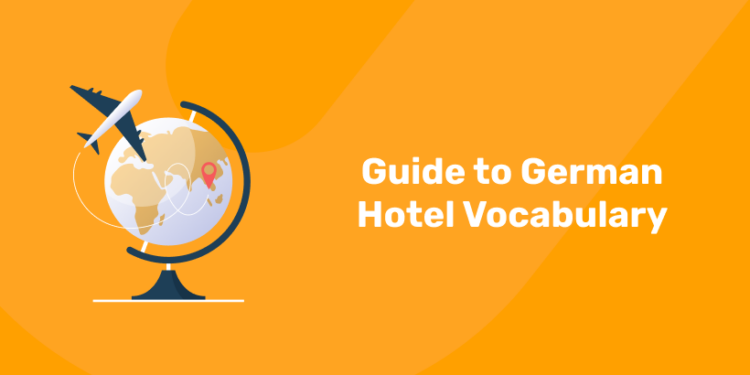Table of Contents
Travelling to Germany or a German-speaking country is exciting, but one common hurdle for visitors is navigating the language. Hotels are a critical part of your journey, and they are no exception. From making reservations to requesting amenities, a good grasp of German hotel vocabulary can save you time, eliminate confusion, and enhance your experience.
German Hotel Vocabulary – Insights
This comprehensive guide is your ultimate resource for mastering the essential German phrases and terms needed for seamless communication during your hotel stay in Germany or other German-speaking regions. It goes beyond a simple list of words, offering phonetics for accurate pronunciation, English translations for easy understanding, and real-life usage examples to help you use the terms effectively in context. Whether you’re a first-time visitor to Germany or a seasoned traveller, this guide equips you to handle hotel interactions with confidence and ease.
German Hotel Vocabulary – Guide
1: How do you say "Good Morning" in German?
To help you get started, here are the most commonly used terms at hotels in Germany, divided into key categories:
Booking and Reservations
| German Word/Phrase | Phonetics | English Translation | Usage Example |
|---|---|---|---|
| Reservierung | reh-zair-vee-roong | Reservation | Ich habe eine Reservierung für heute Abend. (I have a reservation for tonight.) |
| Zimmer buchen | tsi-muhr boo-hen | To book a room | Kann ich ein Zimmer buchen? (Can I book a room?) |
| Anreise | ahn-ry-zuh | Arrival | Wann ist Ihre Anreise? (When is your arrival?) |
| Abreise | ahb-ry-zuh | Departure | Ihre Abreise ist um 10 Uhr. (Your departure is at 10 AM.) |
| Bestätigung | besh-tey-tee-goong | Confirmation | Haben Sie eine Bestätigung? (Do you have a confirmation?) |
Room Features and Amenities
| German Word/Phrase | Phonetics | English Translation | Usage Example |
|---|---|---|---|
| Doppelzimmer | dop-pel-tsi-muhr | Double room | Wir haben ein Doppelzimmer für Sie. (We have a double room for you.) |
| Einzelzimmer | ine-tsel-tsi-muhr | Single room | Möchten Sie ein Einzelzimmer? (Would you like a single room?) |
| Klimaanlage | klee-mah-an-lah-geh | Air conditioning | Hat das Zimmer eine Klimaanlage? (Does the room have air conditioning?) |
| WLAN | vey-lahn | Wi-Fi | Gibt es WLAN im Zimmer? (Is there Wi-Fi in the room?) |
| Minibar | mee-nee-bahr | Minibar | Die Minibar ist im Preis enthalten. (The minibar is included in the price.) |
Dining and Hotel Facilities
| German Word/Phrase | Phonetics | English Translation | Usage Example |
|---|---|---|---|
| Frühstück | froo-shtook | Breakfast | Wann wird das Frühstück serviert? (When is breakfast served?) |
| Restaurant | res-toh-rahnt | Restaurant | Gibt es ein Restaurant im Hotel? (Is there a restaurant in the hotel?) |
| Rezeption | reh-tsep-tsi-yohn | Reception | Die Rezeption ist rund um die Uhr geöffnet. (The reception is open 24/7.) |
| Schwimmbad | shvim-bahd | Swimming pool | Hat das Hotel ein Schwimmbad? (Does the hotel have a swimming pool?) |
| Parkplatz | park-plahts | Parking space | Gibt es einen Parkplatz? (Is there a parking space?) |
Explore the Entri Elevate German language course syllabus to take your skills to the next level!
Free German A1 Mock Tests – Powered by AI!
Test your skills on our interactive platform. Get instant feedback from our AI to help you communicate better and track your progress. Start your free German mock test now.
Test Your German A1 for FreeGerman Hotel Vocabulary – Tips and Tricks
Each of these tips builds on the idea of connecting vocabulary to practical use, memory reinforcement, and cultural understanding. Together, they create a comprehensive approach to mastering German hotel vocabulary.
1. Use Flashcards
- Flashcards are one of the most effective tools for learning new vocabulary.
- Start by writing the German word or phrase on one side of the card and its English translation on the other.
- To make it more engaging, add phonetic pronunciations and even pictures or drawings that represent the word.
- For example, for “Frühstück” (breakfast), you can draw a plate of food or use an image of a breakfast spread.
- Carry these flashcards with you and review them throughout the day—whether you’re waiting in line or commuting.
- Repetition is key, and the physical act of writing down the words can also help in committing them to memory.
2. Practice in Context
- Learning words in isolation can only get you so far. To truly internalize German hotel vocabulary, practice using the words in realistic scenarios.
- You can role-play with a language partner, friend, or even by yourself. For example, simulate a booking scenario:
- You: “Ich möchte ein Doppelzimmer buchen, bitte.” (I would like to book a double room, please.)
- Partner: “Wie lange möchten Sie bleiben?” (How long would you like to stay?)
- If a partner isn’t available, try writing down dialogues or speaking them aloud.
- Mimicking hotel scenarios, such as checking in, asking for amenities, or ordering breakfast, helps you learn the practical application of these terms.
3. Leverage Technology
- Technology offers powerful tools to make learning both interactive and accessible.
- Apps like Quizlet and Anki allow you to create custom flashcards, complete with audio pronunciation.
- Use them during downtime to reinforce your vocabulary.
- Additionally, apps like Memrise or Drops specialize in bite-sized language lessons that integrate visuals and spaced repetition, ensuring long-term retention.
- You can also use voice recognition tools, like those in Google Translate or language-learning apps, to practice your pronunciation.
- Speaking the phrases aloud and hearing them repeated correctly not only builds confidence but also helps you sound more natural.
4. Combine with Cultural Knowledge
- Words come alive when you understand the culture they’re embedded in. German hotel etiquette, for instance, often emphasizes formality and politeness.
- Familiarize yourself with cultural norms, such as addressing staff as “Herr” (Mr.) or “Frau” (Ms.) followed by their last name.
- This knowledge contextualizes your vocabulary, ensuring you use it appropriately.
For example:
- Instead of simply saying, “Ich möchte ein Zimmer” (I want a room), you can say, “Ich möchte bitte ein Zimmer reservieren” (I would like to reserve a room, please), which sounds more polite and aligned with German customs.
- Learn how tipping customs differ in Germany compared to other countries and what polite phrases to use, like “Danke schön!” (Thank you very much!).
5. Immerse Yourself
- Immersion is one of the most effective ways to learn any language.
- If you’re unable to physically immerse yourself in a German-speaking environment, simulate it by surrounding yourself with German media.
- Watch travel vlogs, documentaries, or YouTube videos focused on hotels and travel in Germany. Listen to podcasts like “Coffee Break German” or “Slow German,” which often include practical vocabulary.
- Try to actively engage with the content—pause the video or podcast to repeat phrases you hear.
- For instance, if a vlogger mentions “Rezeption” (reception), take a moment to repeat it and use it in a sentence, like “Die Rezeption ist in der Lobby” (The reception is in the lobby).
- This helps connect the words to real-life contexts, making them easier to recall later.
A Note by Entri
Mastering German hotel vocabulary opens doors to a smoother travel experience. From reserving your room to ordering breakfast, knowing these phrases gives you confidence and independence during your trip.Entri offers specially curated German courses for travelers. With interactive modules and real-world scenarios, their platform ensures you’re ready for any hotel situation. Start your learning journey today and unlock the joy of effortless travel!
Click here to learn more about the Entri Elevate German language course syllabus!
Conclusion
Joining a German language course can seriously improve your speed of learning and the wasteness of materials available to you. Even though you are solely interested in self-learning having a mentor from a reputable platform can give you an edge over those learners who don’t have that. If the course encourages peer interaction, then you will have many people to practise your skills with. Some courses also offer you certificates which can prove to be useful if you need to show proof of your language proficiency level. Entri Elevate German course is one of the best German language courses available on the internet. They provide expert mentors, live classes, recorded sessions, mock tests, pdf notes etc.
Free German A1 Mock Tests – Powered by AI!
Test your skills on our interactive platform. Get instant feedback from our AI to help you communicate better and track your progress. Start your free German mock test now.
Test Your German A1 for FreeFrequently Asked Questions
Why is it important to learn German hotel vocabulary before traveling to Germany?
Learning German hotel vocabulary ensures smooth communication with hotel staff, helps you navigate reservations, check-ins, and requests with ease, and enhances your cultural experience by allowing you to engage more authentically during your stay.
Are there common cultural differences I should be aware of when using German hotel vocabulary?
Yes, politeness is highly valued in German culture. Use formal addresses like Herr (Mr.) or Frau (Ms.) when speaking with staff, and phrases like Bitte (please) and Danke (thank you) to show courtesy. Learning these cultural nuances makes your interactions smoother and more respectful.











